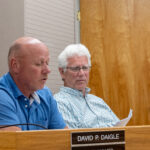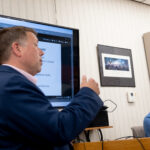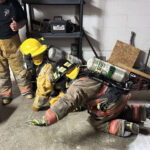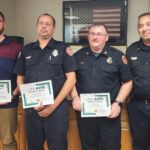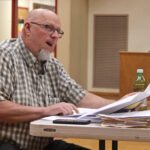CARIBOU — Members of the Central Aroostook Chamber of Commerce gathered at the Caribou Inn and Convention Center last week to hear Consul General David Alward speak of the relationship between Canada and New England.
Alward, formerly a New Brunswick premier, covered a number of issues related to Canada and the United States during the early morning breakfast on Tuesday, June 14.
Imports and exports
The Consul’s speech focused on trade issues, and the importance of maintaining a strong business relationship between the two countries.
“We are closest trading partners, the closest allies, and, quite literally, we are friends and neighbors,” said Alward. “If you think about trade and the importance to each state, Canada is the number-one trading partner with 35 states in the U.S. That includes five of the six New England states.”
The Consul added that 400,000 jobs are directly related to trade between Canada and the U.S.. Maine alone contains 38,500 jobs related to commerce across the border.
Another item brought forth is the percentage of goods sold back to the United States that contain materials that were originally made in America. Alward told Chamber members that roughly 4 percent of the materials purchased from China by the U.S. contain items made in the United States, adding that, in Canada, that number is 25 percent.
“We can’t forget is that our most important trading partner is the country and community right next door,” Alward said. “When Canada sells you an item, on average, 25 percent of that item originated by somebody making a job and creating it in the U.S. So there is real bilateral economic benefit when the U.S. and Canada do business.”
The consul general added that there are plenty of businesses that benefit both sides of the border, such as Cavendish, Irving, and McCain Foods.
“All of these companies are benefitting all of our region,” said Alward. “McCains is a prosperous, rural part of New Brunswick, and has played a significant role on both sides of the border. As we go forward, very often we can get into discourse about whether trade is good or not. Ultimately, it allows businesses to employ people. Employed people have the ability to building strong communities and families, which means that government has the taxes it can invest back into its people. The reality is that trade will benefit all of us.”
Securing the border
Along with trade, Alward spoke about the “Beyond the Border” program, which is the result of an agreement between Canada and America. According to the Department of Homeland Security’s website, this program is a “shared approach to security in which both countries work together to address threats within, at, and away from our borders, while expediting lawful trade and travel.”
“We work closely together on everything from intelligence and inspections to make sure that when things come into Canada or the U.S., the other can have confidence in the work that each of us does,” said Alward.
This served as a segue to the topic of Syrian refugees, and Canada’s efforts to welcome and resettle them into their country.
“Canada took a little different approach to the Syrian refugee crisis,” said Alward. “With the new government, they committed to 25,000 refugees being accepted into Canada, and we are actually over that number now.”
Canada and the United States are working closely together to ensure the safety of their own citizens while accepting immigrants.
“There is a very robust evaluation process to go through,” said Alward. “We also work with groups that are lower risk, which primarily means women, children, and families. You can have full confidence in the assessment process that we go through.”
Encouraging optimism
In response to an audience observation that many surrounding regions feel as though they are at the “end of the world,” in terms of being challenged by population decline, high energy costs, and an aging workforce, Alward ended his presentation by encouraging an optimistic approach.
“Whether you’re in northern Maine or rural New Hampshire, Vermont, or even some areas of Massachusetts, you feel like you’re at the end of the world,” said Alward. “That’s why it’s important to come together and build solutions. If we look at our own individual circumstances, it can be a pretty depressing day, but if you can come together with people that have a vision for tomorrow or who believe in their community, it helps build a little momentum that can allow good things to happen.”

